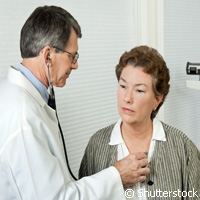International Women's Day shifts perceptions of heart disease
The European Society of Cardiology (ESC) presented on International Women's Day (8 March) research showing that despite being more at risk from cardiovascular disease (CVD) than men, women remain significantly underrepresented in clinical trials for the disease. In a special themed issue of the ESC's official journal, the European Heart Journal (EHJ), two studies carried out by scientists in Canada, Italy and Sweden have found that guideline recommended treatments were significantly underused in women. Although it is widely perceived as a men's health issue, CVD in Europe is responsible for 55% of deaths in women compared to just 43% in men, and more women in Europe die from CVD than from breast cancer; the latter affects only 3% of patients. Further, over the past two decades myocardial infarction (MI) has increased in women aged between 35 and 54, whereas it has declined among men from the same age group. Challenging these misconceptions about heart disease is one of the key goals of the ESC on International Women's Day. The first study, conducted by a team of scientists from Canada and Italy, analysed the medical details of 4,471 men and 2,087 women who had experienced a heart attack (acute coronary syndrome) between 1999 and 2003. Overall, 75.6% of the women studied had received beta-blockers in comparison to 79.4% of men, and 56.37% of the women had received lipid-modifying agents compared to 65.44% of men. Furthermore, 55.52% of women had received ACE (angiotensin-converting enzyme) inhibitors compared to 59.99% of men. Women were also found to be less frequently referred for cardiac cauterisation than men. The researchers identified multiple factors contributing to these differences in treatment. One factor is patient age - women are more likely to develop heart failure at an older age and physicians may be concerned about prescribing drugs to the elderly. Another factor is the presence of congestive heart failure; women are more likely to develop this during a heart attack and many physicians are reluctant to prescribe beta-blockers to patients already experiencing it. 'We've known for years that women are treated differently from men, but now this study shifts the philosophy and starts to explain why,' comments lead author Raffaele Bugiardini from the University of Bologna in Italy. In the second study, carried out by researchers in Sweden, the use of cardiovascular medications and diagnostic coronary angiography was analysed in 7,195 men and 5,005 women who had been experiencing chest pains and were suspected of having coronary heart disease (CAD). Their findings uncovered that 83% of women had been prescribed aspirin prior to undergoing angiography compared to 86.1% of men. However, the study also highlighted that among the youngest demographic - those under 59 years of age - 78.8% of women who underwent angiography were found to have non-significant CAD compared to 42.3% of men. Left main or three vessel disease was also found to be more common in men. These results help shed some light on the difficulties clinicians face in diagnosis. 'The problem we identified is that if physicians see women aged 55 to 60 years with atypical symptoms in the emergency room they don't automatically think of heart attacks,' says ESC's Marco Stramba-Badiale. 'It is very important that data concerning women is analysed separately because there are often differences in the pharmacodynamics, pharmacokineteics and physiology in comparison to men, making it possible that the efficacy of drugs might be completely different in women.' In order to better understand female physiology when it comes to treating heart problems, the ESC has long campaigned for the increased inclusion of women in clinical trials, and this International Women's Day they are calling on the European Medicines Agency (EMA) to make fairly representing women a requirement when it comes to licensing pharmaceutical agents. Dr Stramba-Badiale continues: 'The problem is that despite female gender being associated with worse cardiovascular outcomes there are still major misconceptions among both health professionals and the public that cardiovascular disease isn't as serious in women as men.'For more information, please visit: European Society of Cardiology (ESC):http://www.escardio.org/Pages/index.aspx European Heart Journalhttp://eurheartj.oxfordjournals.org/
Countries
Canada, Italy, Sweden



